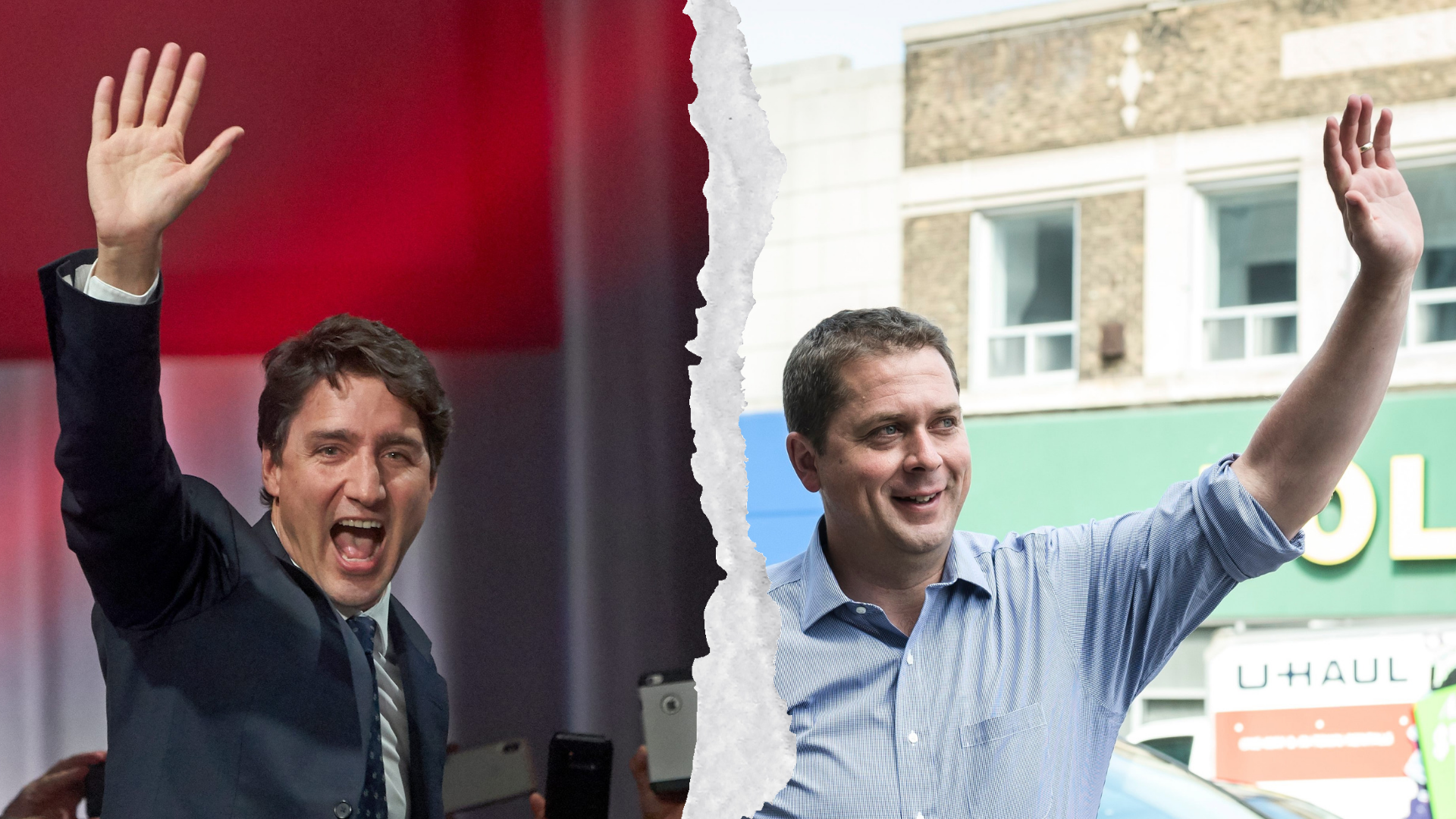Canada Is Truly Divided Now

Credit to Author: Drew Brown| Date: Tue, 22 Oct 2019 16:43:11 +0000
The aughts are back, baby. The New Pornographers and Rheostatics both put out new albums this year and Canada has a new minority government. Adjust yourself accordingly; 00s nostalgia is in full effect.
After 40 days in the campaign trenches, the Liberals will form a minority government with 157 seats, centred almost entirely in Laurentian and Atlantic Canada. The Conservatives took about 600,000 more votes overall, and will form an opposition of 121 MPs acting as a de facto Prairie bloc in the Commons. The literal Bloc Quebecois came third with 32 MPs, solidifying the newly muscular nationalism ascending in the province. Despite rallying in the final weeks, New Democrats declined to fourth with 24 seats, smattered across the country but with a bulwark in British Columbia. The Greens took three seats, including an upset in Fredericton, New Brunswick. Jody Wilson-Raybould was re-elected as an Independent, and the People’s Party of Canada cratered in last place as leader Maxime Bernier was handily unseated by a Tory dairy farmer.
It was a bitter campaign that raised more problems than last night resolved. The Liberals’ efforts to strike a middle ground between climate action and the energy industry—bringing in a carbon tax while also subsidizing industry in Alberta and buying the Transmountain Pipeline—failed to win them any seats in the Prairies and further entrenched the petroligarchy that has firmly gripped the region. If you thought the pipeline fight got tense between Rachel Notley and Justin Trudeau, just wait for the Jason Kenney Energy War Room to really rev its engines. As the stakes and rhetoric around the tar sands mount—with government and opposition literally divided along this bitter regional faultline—this conflict seems likely to escalate and boil over in our new Parliament. The threat of Western separatism is vastly overblown, but the deep well of anger those fantasies are drawn from is very, very real.
Similarly, Quebec’s Bill 21—barring public employees from wearing visible religious symbols, i.e. Muslim women in hijab—was roundly and repeatedly denounced by Anglo political leaders (and commentators) from the beginning of the campaign. At various moments it functioned like a stand-in for questions about race and multiculturalism in Canada, particularly during the English language debate where the onus was continually placed on Jagmeet Singh to justify minority rights. But as the campaign wore on, Bill 21 evolved into a clear symbol of Quebec’s right to autonomy and cultural self-determination—not a sovereigntist or separatist impulse, but an assertion of Quebec’s rights as a nation within Confederation. Hence the resurgence of the Bloc as a voice for Quebec’s “national interest,” another regional refrain in a deeply discordant Parliament.
Anyone hoping that minority status will chasten the Trudeau Liberals or lead to a more collaborative House of Commons is not advised to hold their breath. If anything, they might want to buckle up. While a minority government does require the Liberals to regularly answer to the authority of the House, they are close enough to the 170-vote majority line—and their opposition so fractured—that they can play a pretty rough ballgame. The first thing Justin Trudeau did after losing his majority government was broadcast his victory speech at the same time as his rivals gave concessions, forcing all three to compete for airtime. If anything, the breakdown of the Commons encourages more political brinkmanship rather than less.
The idea that the Liberals and NDP are naturally inclined to work together is more of a comforting myth than a reality. We are less likely to see a coalition government or even a supply-and-confidence agreement between the two parties than we are likely to see Trudeau take up the cudgels of the Harper years: governing alone, taking every vote as it comes, playing the opposition off each other for piecemeal support, and using the threat of another election (and more political chaos) to whip at least one of the other major three parties in line for every confidence vote. There will be the threat of a snap election every two weeks and all partisans will work themselves up into a froth only to be deflated at the last minute by a political deal. Rinse and repeat until Trudeau either decides he’s ready for another trip to the polls or he overextends himself and the opposition benches revolt. This hateful election campaign might have finally ended, but the next one has already started.
It’s unclear what the 2019 election was ultimately “about.” There were obviously big policy issues: climate action, cost of living, energy policy, housing. There were also larger discussions around race, immigration, multiculturalism, and how each of these intersects with “Canadian values”—whatever those are. There was also a lot of discussion about what Canada owes to Indigenous peoples and what governments could do to deliver, although that was more in the context of how little these issues were being addressed by any party during the campaign and the Liberals’ particularly shameless actions (and inactions) on the file while in office. But there was no single thread uniting the campaigns into coherent wholes, except insofar as this was a “referendum” on Justin Trudeau.
After this election Canada seems less a country than several small semi-countries trapped together in a hall of mirrors. All the provinces are talking past one another and instead of anything resembling a national vision in Ottawa, we will have a set of regional blocs all jostling to refashion the country in ways unpalatable to each other.
And at the centre of it all is Justin Trudeau, his majority revoked, the oilpatch in revolt, the BQ breathing down his neck, the NDP flanking his left, and a world system going up in flames. The country has reluctantly chosen forward. Now it’s up to the prime minister to show us that he can shift gears.
Follow Drew Brown on Twitter.